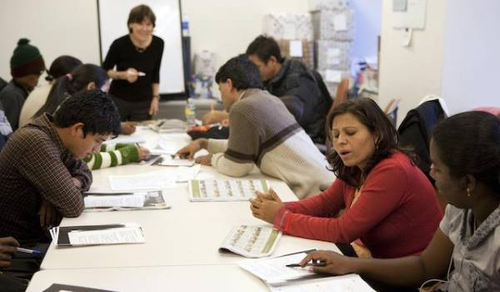Learning English

Learning English
If you do not speak English, resettling to the United States may seem intimidating. Getting around, finding a job, even shopping for groceries will be difficult with limited English-speaking abilities. However, learning English will ultimately help you adjust successfully to your new community. Learning to speak and understand English will help you become more self-reliant, find employment with better pay, and interact with new friends and neighbors. You may not have much time to study English before finding a job, but once you find a job, you will need to study English and work at the same time. Until your English improves, interpreter services are available at places like hospitals and courts for those who need them.


Benefits of Learning English
English is the most commonly used language in the United States and most people in the United States will not be able to speak to you or understand you if you do not learn English. Learning English is necessary for you to survive and flourish. If you have children, understanding English will help you engage with your children’s school. In addition, you will need to learn English in order to be a connected and informed resident in the city and state where you live. You will need to learn English in order to pass a test when you apply for U.S. citizenship.
You will learn English much faster if you have a strong desire to learn the language. Here are some reasons why learning English is important:
- To get a job and be successful on the job.
- To communicate with your children’s teachers.
- To know what your children and grandchildren are saying.
- To be independent: to take public transportation and shop for yourself and your family.
- To talk to your neighbors.
- To find out what is going on in the world through television, newspapers, and the internet.
- To pass the U.S. naturalization test so that you can become a citizen of the United States.
- To talk to co-workers and other people in the community.
- To make doctor’s appointments and attend them without an interpreter.

English Classes
Many communities offer English classes to immigrants and refugees who have recently arrived in the United States.
In English classes, men and women of different ages, education, and ethnic backgrounds sit together. In beginning-level classes, students usually study simple, practical English that a newcomer needs to get around. For example, you may learn English phrases to help you buy things in a store, read a bus schedule, or look for a job. Some classes teach the English needed for certain jobs, like working in a hotel or working in the medical field. In higher-level classes, students pay more attention to English grammar, reading, and writing. There are also English classes that prepare students for college.
Other Ways of Learning English
There are many different ways to learn English. Often, a combination of ways is most effective. Below are some examples of ways to learn English outside of the classroom:
Learn English at work. When you get a job, you may learn the English vocabulary and expressions that are useful for that job. You will have coworkers and possibly clients or customers who speak English. Speaking with them will help to improve your English.
Learn English in your community. Be sociable and willing to meet new people. Talking with strangers in stores and practicing English with friends or neighbors can be difficult at first, but most people will be friendly and helpful. Join or start an English language or cultural exchange club in your neighborhood and meet regularly to speak only English. Plan activities you enjoy with the group, like visiting a museum or going for walks in a park. This will be a good way to practice speaking English with others who are learning the language or who already speak English. This can also be a good way to learn about American culture and customs.
Learn independently. Motivate yourself to learn English wherever and whenever you can. You can do this by watching English movies or television shows, or by listening to English programs on the radio. Keep a list of new words you learn and try to read the English that you see around you on street signs, on buses, and in the windows of stores.
Learn as a family. Everyone in your family will be learning English with you. Make it a fun family activity by playing English language games and having “English only” time at home each day. Get involved at your child’s school by volunteering to help in the classroom or at special events. Children learn new languages quickly, so it’s important to keep up with them.
Learning English Takes Time
In the beginning, you may find it hard to learn English and may feel frustrated. It is normal to feel this way. Each person learns at a different pace and in a different way. You should try different methods to find what works best for you. The key to learning a new language is to practice it every day. Even if you listen to the radio or watch television in English for only ten minutes a day, this will help. With time and practice you will become more comfortable speaking English and this will help ease your adjustment process in the United States. This will take time but it gets easier if you keep trying.


